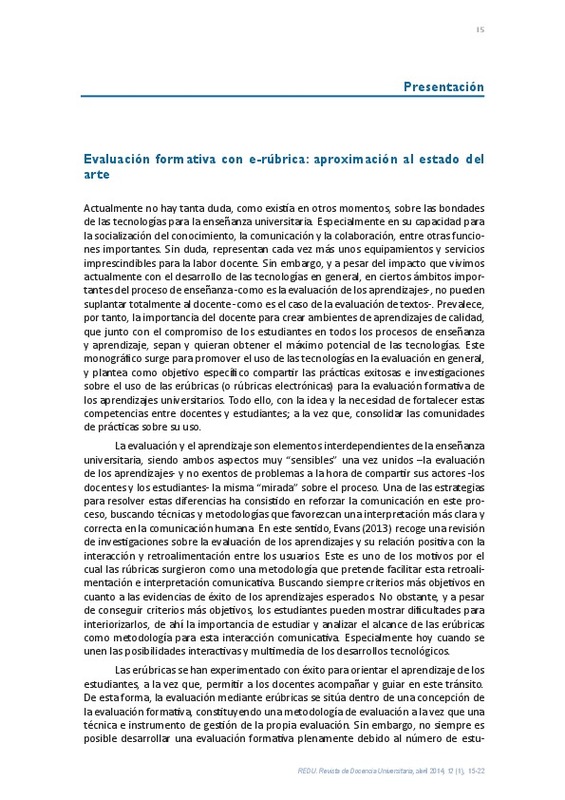Andrade, H. (2005). Teaching With Rubrics: The Good, the Bad, and the Ugly. College Teaching, 53:1, pp. 27-31. http://dx.doi.org/10.3200/CTCH.53.1.27-31.
Blanco, A. (2009). Desarrollo y evaluación de competencias en educación superior. Madrid: Narcea.
Blanco, A. (2010). Investigación empírica sobre evaluación alternativa y evaluación de competencias en educación superior. Una aproximación tentativa al estado de la cuestión. Congreso evaluación global de los resultados del aprendizaje en las titulaciones dentro del EEES. Universidad Complutense de Madrid. 1 de octubre. http://www.urjc.es/ordenacion_docente/app/congreso_calidad/archivos/ Conferencia_Clausura.pdf
[+]
Andrade, H. (2005). Teaching With Rubrics: The Good, the Bad, and the Ugly. College Teaching, 53:1, pp. 27-31. http://dx.doi.org/10.3200/CTCH.53.1.27-31.
Blanco, A. (2009). Desarrollo y evaluación de competencias en educación superior. Madrid: Narcea.
Blanco, A. (2010). Investigación empírica sobre evaluación alternativa y evaluación de competencias en educación superior. Una aproximación tentativa al estado de la cuestión. Congreso evaluación global de los resultados del aprendizaje en las titulaciones dentro del EEES. Universidad Complutense de Madrid. 1 de octubre. http://www.urjc.es/ordenacion_docente/app/congreso_calidad/archivos/ Conferencia_Clausura.pdf
Bretones Román, A. (2008). Participación del alumnado de Educación Superior en su evaluación. Revista de Educación, 347. pp. 181-202.
Brown, S. & Glasner, A. (2003). Evaluar en la Universidad. Madrid: Narcea.
Campbell, A. (2007). Application of ICT and rubrics to the assessment process where professional judgement is involved: the features of an e-marking tool. Evaluation in Higher Education, 30:5, pp. 529-537. DOI:10.1080/02602930500187055.
Carneiro, E.; Lefrere,P & Steffens, K. (2007). Self-regulated Learning in Technology Enhanced Learning Environments: A European Review. http://www.lmi.ub.es/taco net/documents/srlinteles3.pdf
Evans, C. (2013). Making sense of assessment feedback in Higher Education. Review of Educational Research, V.83, nº 1, pp 70-120. DOI: 10.3102/0034654312474350.
Falchikov, N. (2005). Improving assessment trough student involment. New York EEUU: Routledge.
Hargreaves, E. (2007). The validity of collaborative assessment for learning. Assessment in Education Vol. 14, No. 2, pp. 185-199.
Jonsson, A. & Svingby, G (2007). The use of scoring rubrics: Reliability, validity and educational conséquences. Educational Research Review 2, pp. 130-144. http://dx.doi.org/10.1016/j.edurev.2007.05.002.
Lapham, A. & Webster, R. (2003). Evaluación realizada por los compañeros: motivaciones, reflexión y perspectivas de futuro. En Brown, S. & Glaser, A.; Evaluar en la universidad. Problemas y nuevos enfoques. Edit. Nancea. Madrid.
López-Pastor, V. (2009). Evaluación formativa y compartida en educación superior. Madrid: Narcea.
Luxton-Reilly, A. (2009). A systematic review of tools that support peer as sessment. Computer Science Education Vol. 19, No. 4, pp. 209-232. http://dx.doi.org/10. 1080/08993400903384844.
Martínez-Figueira, E.; Tellado-González, F. y Raposo-Rivas, M. (2013). La rúbrica como instrumento para la autoevaluación: un estudio piloto. Revista de Docencia Universitaria Vol.11 (2), pp. 373-390.
Orsmond,P.; Merrys,S. & Reiling,K. (1996). The Importance of Marking Criteria in the Use of Peer Assessment. Journal Assessment & Evaluation in Higher Education, V. 21, nº 3, pp 239 - 250. DOI: 10.1080/0260293960210304.
Panadero, E. & Jonsson, A. (2013). The use of scoring rubrics for formative assessment purposes revisited: A review. Educational Research Review V. 9, pp. 129-144. http://dx.doi.org/10.1016/j.edurev.2013.01.002.
Panadero, E. & Alonso-Tapia, J. (2013). Self-assessment: Theoretical and Practical Connotations. When it happens, how is it acquired and what to do to develop it in our students. Electronic Journal of Research in Educational Psychology, 11(2), pp. 551-576. http://dx.doi.org/10.14204/ejrep.30.12200
Prins, F., at all. (2005) Formative peer assessment in a CSCL environment: a case study. Assessment & Evaluation in Higher Education Vol. 30, No. 4, pp. 417-444. DOI: 10.1080/02602930500099219.
Reddy,Y. & Andrade, H. (2010). A review of rubric use in higher education. Assessment & Evaluation in Higher Education Vol. 35, No. 4, pp. 435-448. http://dx.doi.org/10.1080/02602930902862859.
Rodríguez-Gómez, G. & Ibarra-Sáiz, M.S. (2011). E-Evaluación orientada al e-aprendizaje estratégico en educación superior. Madrid: Narcea.
Søndergaarda, H. & Mulder, R. (2012). Collaborative learning through formative peer review: pedagogy, programs and potential. Computer Science Education, Vol. 22, No. 4, pp343-367. DOI: 10.1080/08993408.2012.728041.
Vickerman, P.H. (2008) Student perspectives on formative peer assessment: an attempt to deepen learning? Assessment & Evaluation in Higher Education, 1-10.
[-]







![PDF file [Pdf]](/themes/UPV/images/pdf.png)

